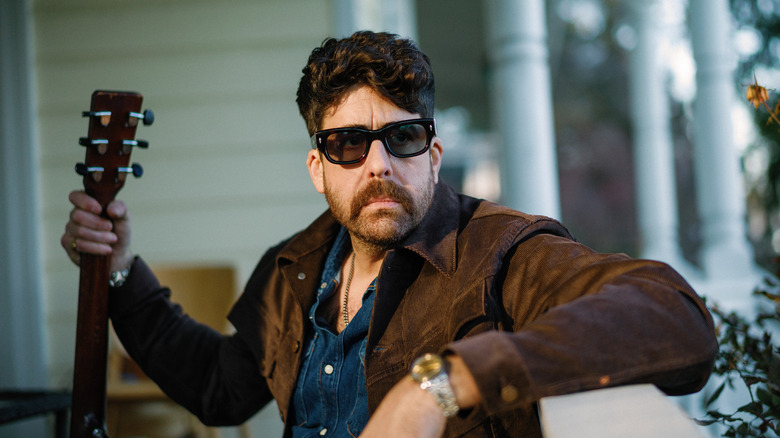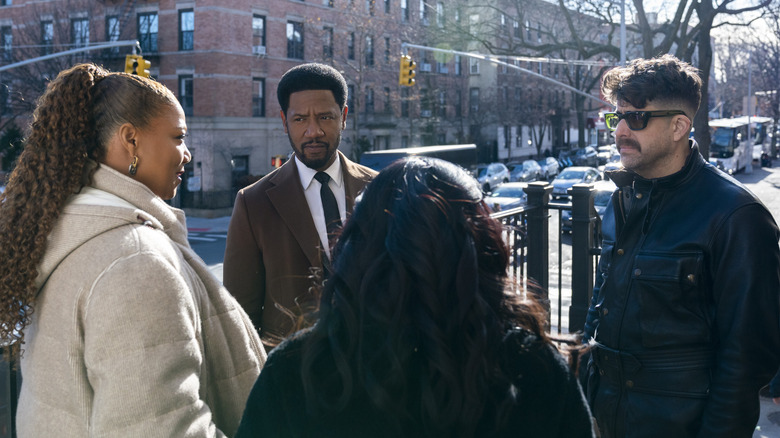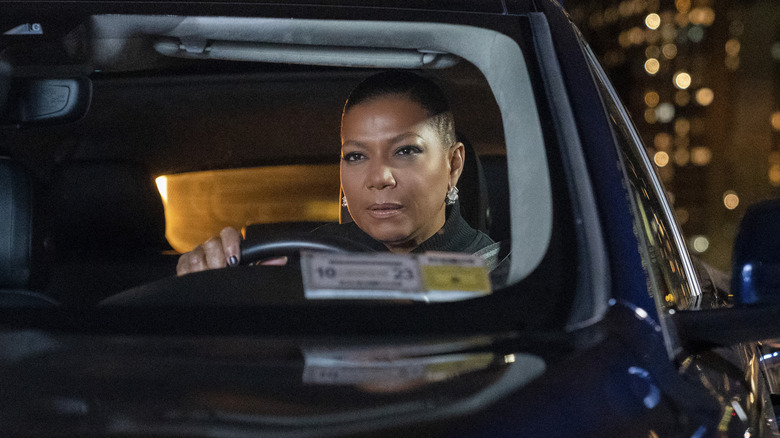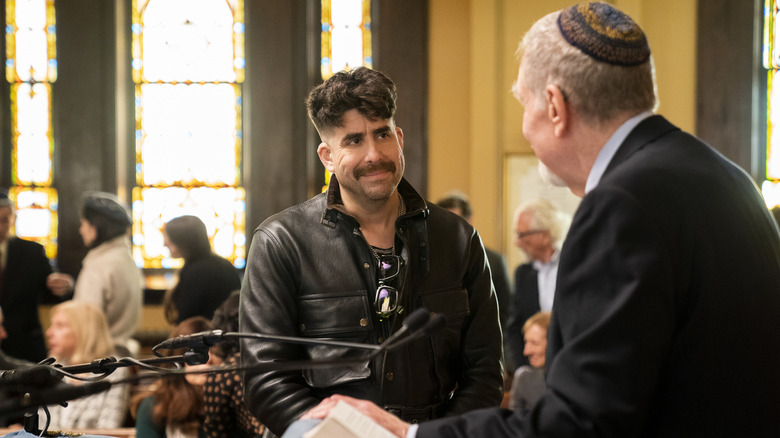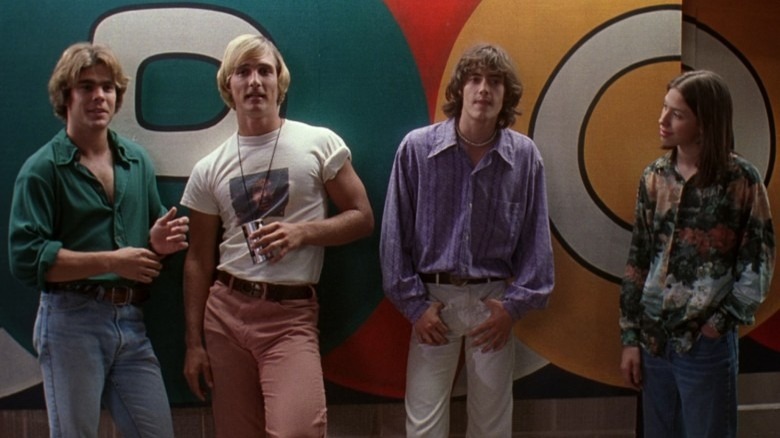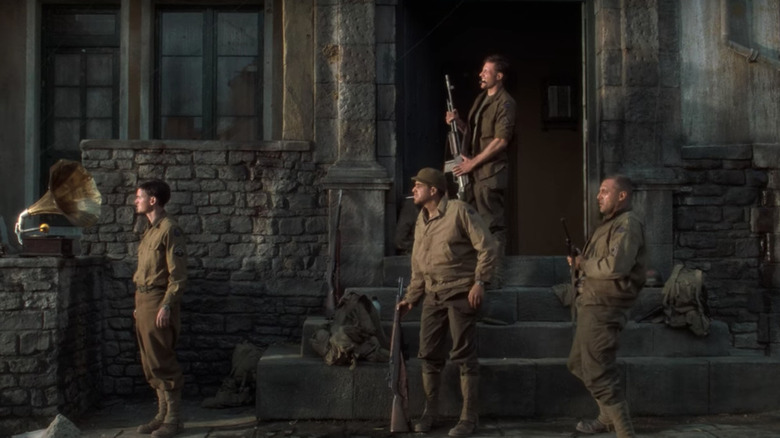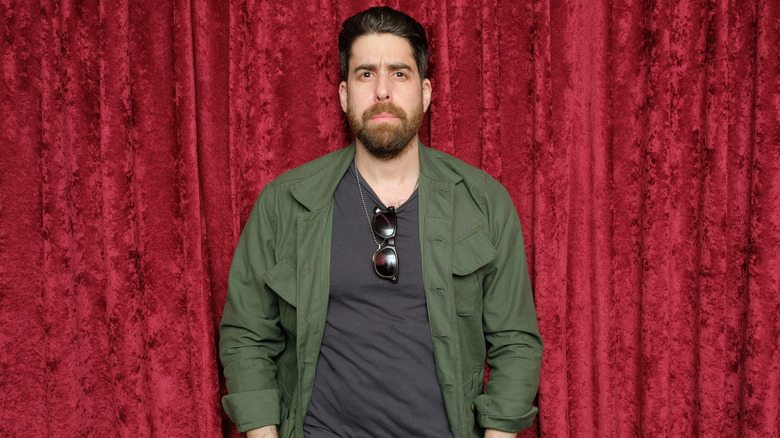The Equalizer's Adam Goldberg Unpacks Harry And The Impact Of Dazed And Confused - Exclusive Interview
Adam Goldberg has made a name for himself in Hollywood by, well, being himself — a little quirky, a little self-conscious, and a whole lot relatable.
Goldberg's first major role came in 1992's "Mr. Saturday Night," alongside Billy Crystal. But many long-time fans will probably most equate him with Richard Linklater's 1993 cult classic "Dazed and Confused" or 1998's Academy Award-winning "Saving Private Ryan." Since then, he has appeared in such high-profile films as "A Beautiful Mind" and "Zodiac" and starred in the critically acclaimed 1st season of "Fargo."
In 2021, he began starring on CBS' wildly successful reboot of "The Equalizer," where he portrays master hacker Harry Keshegian, the right-hand man of Robyn McCall, aka the Equalizer, played by Queen Latifah. The hit show, which is now airing its 3rd season on Sunday nights, is a reimagining of the original 1980s series of the same name, which also spawned a blockbuster film franchise starring Denzel Washington.
During an exclusive interview with Looper, Goldberg discussed what makes his role on "The Equalizer" so compelling, what we'll learn about Harry in the upcoming Season 3 episode titled "Never Again" (airing this Sunday night), and how it felt to step onto the "Dazed and Confused" set some 30 years ago.
Filming The Equalizer keeps Goldberg on his toes
What does starring on a TV show like "The Equalizer" allow you to do as an actor that films don't?
It depends on the show — and I definitely feel like I've been on every conceivable type of television show you could be on, whether it's a four-camera show or something on the other end of the spectrum, like "Fargo." They each bring with them different challenges and opportunities.
With this show, it's very specific what I do on it, so I'm using this very specific part of my brain, which is probably good to keep me neuro-flexible as I age. I keep thinking that it's an exercise to offset any potential early-onset dementia because there's so much information in each episode, and on the periphery of it, and I'm always having to disseminate it.
The way that you shoot, you're finishing one episode and then you begin shooting another, and there's totally different people, totally different stories, totally different nomenclature, totally different technology. I feel like it keeps me intellectually nimble, which is good. In that regard, it's a whole other kind of work. This episode that's coming up was something I'm much more accustomed to, which is operating from an emotional foundation. It's much less technical because it's about whatever my particular struggles are.
Why was Harry, in particular, so compelling to you?
This was a show that I was initially offered on March 10, 2020 [right before the pandemic]. They were like, "[Filming] starts on Friday, and you have to fly in on Thursday." I was like, "I'm not getting on an airplane to New York. That's insane." Sure enough, two days later, we were in lockdown. Then it resurfaced much later in the year, which was during a very eerie period for everybody. Certainly, in terms of work, it seemed particularly uncertain. So I'll never be able to separate my decision to do this show from the pandemic itself.
To be even more candid, because that's the way I am, I rarely choose the opportunities that I have. The opportunities I've had as an actor have more or less come to me. There have been independent films and films I've made myself that I've either created or helped [to develop] in the more embryonic stages. Other than that, I feel like unless you're the top 0.5% of the acting population, your career chooses you. [Actors during] interviews often act as though they've curated their careers, but it doesn't really work that way.
Well, you've had a long-running career that has come to you.
It's true. There are very few parts that are on my resume that I've had to work very hard to get. Either the audition process was incredibly simple, or there was no audition and it was just offered. Then there's a whole other parallel sliding-doors career I've had, which are things I haven't done where I've worked really hard to try and get those roles or get these projects developed. That's the irony, I guess. On the one hand, I consider myself extremely lucky and grateful because it has been 30-plus years of working fairly consistently. But I always feel like it's because someone needs an Adam Goldberg-type, so every once in a while, they choose me.
He had an instant connection with Queen Latifah due to COVID
The third installment of the "Equalizer" film series starring Denzel Washington is set for release later this year.
Is that true? I had no idea. That's the first time I'm hearing of it.
Yeah, it's true! Do you hope there will be any crossover opportunities between the film and the show?
I'll be honest with you: I've never seen the films. I remember "The Equalizer," the OG TV show, but I never saw the films. So I don't even know what the relationship is in terms of the "Equalizer" universe. ... That would be cool, though, but it's the first I'm hearing of it.
Have you had the opportunity to talk to Denzel since starring on the series? You two worked together on "Déjà Vu" back in 2006.
No. I have not seen him probably since the premiere of that movie.
On the show, Queen Latifah basically steps into Denzel's shoes. What's it like working with her? Do you have any good on-set stories you can share?
She's a super-duper cool, nice person. She's like an institution in a way, but we're all pretty friendly and it's pretty jocular. Nothing is really ever that serious. [On] this show, there's so much to do, and [in] the scenes that she and I are in, there's so much to say that everybody's just trying to keep words from spilling out of their ears. It's a lot of concentration.
I guess I tend to be the class clown, and she's got a really good sense of humor. We talk about motorcycles. She rides motorcycles and I ride motorcycles. We talk about music. She's very eclectic, as am I, and her tastes are very broad, like mine are. We always talk about music documentaries and things like that. She's cool.
It's strange, though, because when we began shooting, it was November of 2020 — a very weird time. It's an extremely counterintuitive way of working, with all these [COVID] regulations. As it turns out, she's a very conscientious person, and I'm extremely conscientious — verging on full-fledged OCD — and so is Liza Lapira [who plays Goldberg's on-screen wife, Melody]. We all had to trust each other a lot in the beginning, in the pre-vaccine days, and there was a lot of immediate trust because it was clear that we were all very careful and conscientious.
Still, it's hard to connect with people when you're essentially masked all the time and you're in this sterile environment. It's certainly not conducive to developing familial relationships, so it took a long time for us all to feel comfortable on set. That was the nature of the time during which we began shooting.
The first literal breath of somebody else's air, other than my family's, that I inhaled in a close, enclosed space was Queen's. My very first day of shooting was in a car with Queen, and I had been draconianly careful, and I was like, "All right, here goes." That was the first time I had breathed another person's air, but if you've got to breathe another person's air, it might as well be Queen Latifah's.
We'll learn more about who Harry is in the next episode
The series has a few more episodes this season and has already been picked up for Season 4. What can we expect from Harry going forward?
As time has gone on, they've really tried to flesh out some of the supporting characters. Everybody's got their own struggle or backstory, and they really, finally flesh out my character in this next episode, which is about antisemitism. We learn about these antisemitic attacks that are taking place. It's partly based on me being half Jewish. They made the character half Jewish, which isn't something that was ever discussed, because [my character has] an Armenian last name. But at some point, they decided I was half Armenian, half Jewish. We get into what my backstory is, with my mom having abandoned me when I was younger and then dying. All of this comes as I'm investigating these antisemitic attacks.
It's something they definitely consulted with me on to some degree and engaged me in discussions about for months. I've been pretty vocal [about the subject] in the last several years on social media before finally deleting Twitter after Elon Musk took over. I was going down these wormholes. Essentially, with the rise of Trumpism in 2016, I found myself being on the receiving end of unbelievable amounts of antisemitic attacks on social media, and it brought to my attention how barely dormant all of these sentiments had been, not as though I had been unaware of that.
So this was a very personal episode, and it was a nice way for me to channel a lot of what has felt like screaming into the ether. I think we feel that way about all sorts of issues — like we're all yelling into an echo chamber or attempting to engage with people whose minds are never going to change. There was a little catharsis for me.
He knew he was making movie history while on the set of Dazed and Confused
Switching gears and looking at past work of yours, "Dazed and Confused" is celebrating its 30th anniversary this year.
Wow. Do you know everything I don't know? I was actually wondering when that [anniversary] was. I'm sure I could have done the math, but I didn't. I always think about the anniversaries of when we shot it. I guess I missed that. That would have been last summer.
When you got that role, did you feel like you were shooting such an influential film?
When I was a young actor, I remember getting the phone call that I got this role in "Mr. Saturday Night" ... and I was pumping my fist. I was 19 or 20, and I was like, "All right, this is it." But of course, it wasn't "it." For a long time, you think everything is "it," and then you start to realize nothing is "it." There's always going to be a reset, and you're always going to have to go back to work, and you're always going to have to figure out where your next job is coming from.
But to answer your question, yes. The pedigree of it seemed right for it being an important film — though whether it was going to be immediately successful remained to be seen. And it wasn't. It famously had a botched release by Gramercy Pictures, which was this new indie-major subsidiary of Universal. We were all ensconced in that because we were all friends with Rick [Linklater]. By the end of the film, we were all very tied into the politics of the distribution of it, which left me and my friends with this sh**ty taste in our mouths about how the thing was distributed.
In terms of while we were making it, we certainly felt like, "Yeah, Rory [Cochrane as Slater] is the Sean Penn," because Don Phillips, the guy who cast it, had famously discovered Sean Penn to play Spicoli [in "Fast Times at Ridgemont High"], and [producers] Jim Jacks and Sean Daniel had this similar pedigree. Then with Rick, I had known his film "Slacker," and ["Dazed"] was at that time where independent film was this super-cool novelty and not everybody was doing it. It stood out to me as a potentially important film, which I also happen to think was a great movie.
I didn't know how [Linklater] was going to do it because the script didn't seem to be about anything. But I also trusted that because it was such a collaborative process, and I related to that. So it was like, "I get this. It's really collaborative and improvisational." It fed into a lot of my sensibilities. I always said that the people who thrived in ["Dazed"] were the people that had some improvisational skills, and the people that didn't felt a little bit at bay because we used to joke that Rick's direction consisted of being like, "Yeah, so you're standing there and you're upset and whatever. Okay, action, I guess."
It was incredibly exciting. I was only there for four weeks, but I always say it was my surrogate college experience. I'd gone to college for a year. I essentially had a nervous breakdown and I dropped out. But this felt like all of the s*** that was supposed to have happened, all of the socialization that was supposed to have occurred for me, in this incredibly concentrated period of time. It was super exciting.
He kept Private Mellish underwear from the Saving Private Ryan set
Do you have any cool keepsakes from the "Dazed and Confused" set or anything like that?
I did for a while. Unfortunately, I'm incredibly anal-retentive — and anal expulsive. It's disgusting, I realize. But in other words, I'm extremely nostalgic. I'm very fastidious about documenting things and always have been. Yet I'm also very sloppy. For the longest time, I had the whole outfit. I was wearing my own Dickies and my own combat boots and watch. Those were mine. I believe [they gave me] the T-shirt, the flannel, and the belt. And the belt, for the longest time, I used to wear. But I don't know where any of it is now.
I don't know that there would be anything else other than that. I can't even find the photos I took, which are prints. When they were doing the "Dazed" book, they asked all of us for photos, and I had these bins of thousands of photos, and I couldn't find them, which is really, really irksome.
I think about this a lot with "Saving Private Ryan," too, because I had some really good ones from that, and I put them in storage. This was in the late '90s, and I move around a lot. But I think I know what storage facility it's in.
I have the ["Saving Private Ryan"] helmet with everyone's autograph on it, and I have the hat I wore. For the longest time, I wore Private Mellish underwear because we all were given underwear. I don't know why they gave us underwear, but it was just Calvins. It's the same underwear that I wear, those black Calvins. But it said "Mellish" in all the underwear, I guess because we got wet a lot, so we'd have to change all the time.
He'd love to play Leonard Cohen one day
Having appeared in such a wide swath of television and film, is there a dream role or even genre that has so far eluded you that you'd like to try your hand at?
There are so many roles I see where I'm like, "damn it" — less and less, though, because I don't have the same ... I don't want to say I don't have the same fire. I've just come to understand what my role is in the industry to some degree, and also in my life. I have young kids. I was a late bloomer, so I have an 8-year-old and a 4-year-old. Now it's much more about, "Let's just stay employed and get these kids through school." But every once in a while, there'll be something.
There's an Israeli production company called Keshet. They did "Homeland." They bought the rights to the story about Leonard Cohen, who went to Tel Aviv in the early 1970s to play some concerts, and it's all about that. I'm obsessed with Leonard Cohen. ... There are things like that where I'm [very interested]. But it's rare these days because I don't keep my ear to the street. It's too exhausting; there's too much rejection.
I have a lot of other passions and interests, and acting allows me to explore those, whether it's music, writing, filmmaking, photography. But every once in a while I'll hear about something and it gets me riled up, and then I'll bother my manager. I've never been one of those guys who calls their agent every day. I don't even have an agent anymore. But cast me to play Leonard Cohen. That's all I have to say. That's my last word on the subject.
This interview has been edited for clarity.
Adam Goldberg currently stars on "The Equalizer," which airs new episodes on Sundays at 8 p.m. ET/PT on CBS.
